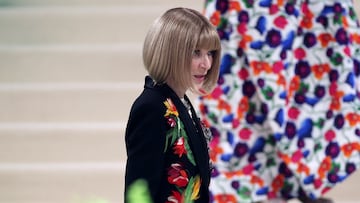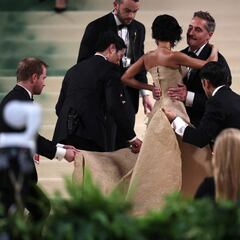Anna Wintour’s look at the Met Gala 2024: What was it inspired by and why did she wear black?
The world-renowned fashion designer sported her own special look at the party she made into a pop culture staple.


At the 2024 Met Gala, Anna Wintour, the iconic editor-in-chief of Vogue, made a statement with her striking black Loewe coat. The dress, designed by Jonathan Anderson for Loewe, was a masterclass in understated elegance, exuding a sense of sophistication that has become synonymous with Wintour’s style.
Anna Wintour in bespoke LOEWE at the Met Gala 2024.
— LOEWE (@LoeweOfficial) May 7, 2024
Inspired by a circa 1944 evening cape by 20th century designer Charles James and tailoring from the LOEWE Fall Winter 2024 women’s collection, Anna’s tuxedo in wool with a silk satin shawl collar is decorated with floral motifs… pic.twitter.com/hARcKk3xpO
The inspiration behind Wintour’s look was a nod to the theme of the event, “The Garden of Time,” which was derived from the Costume Institute’s spring exhibit “Sleeping Beauties: Reawakening Fashion.” The exhibit explored the evolution of fashion over time, highlighting the ways in which designers have drawn upon historical influences to create modern masterpieces. Wintour’s choice of a black Loewe coat was a direct reference to this theme, paying homage to the pioneering work of Charles James.
His designs were characterised by their highly structured aesthetic, with sculpted ball gowns made of lavish fabrics, and exacting tailoring standards. Wintour’s black Loewe coat, with its sleek silhouette, was a modern interpretation of Worth’s iconic designs, blending the past with the present.
Who is Anna Wintour?
Anna Wintour has been the editor-in-chief of Vogue magazine since 1988. Born on November 3, 1949, in London, England, Wintour has become one of the most powerful figures in the fashion world. She is known for her distinctive style, which includes her signature pageboy bob haircut and dark sunglasses.
Related stories
Wintour’s career in fashion began as a fashion assistant for Harper’s & Queen magazine in 1970. She later worked as a fashion editor for various New York magazines before becoming the editor of British Vogue and then American Vogue, where she has been instrumental in shaping the magazine’s direction and influence, keeping it relevant in an age of dying print-media.
“If you look back at the early days of the [Met Gala], it was really a society event,” Wintour biographer Amy Odell told TIME. “Anna’s innovation was to make it a pop culture event, like the Super Bowl of red carpets, which is what it is today.”

